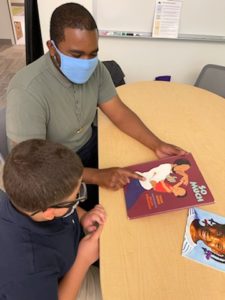
Principal Mark McCann was one of the first school leaders in Springfield, Massachusetts to invite The Literacy Lab into his school at Lincoln Elementary back in 2018. He recognized that some students were starting behind their peers or had gaps in their learning. Often these were students of color and students from low-income households. To close these gaps, he was ready to invest in programs with a proven track record.
The evidence based model of literacy inventions used by The Literacy Lab was just what he thought his students needed to succeed. Since then, Principal McCann has seen first-hand the growth students have made. More importantly he witnessed the students recognizing their own growth. When students see themselves grow and improve, it instills a sense of pride and they believe in themselves, he says.
It is not just the literacy interventions that keep Principal McCann inviting The Literacy Lab back; it is also the amazing young people serving as Tutors. They are often more racially diverse than the school staff and they better reflect the students’ identities and experiences. DiOnte Moore, for example, started his career at Lincoln Elementary as a Literacy Lab Tutor and now serves as a 3rd grade paraprofessional. He formed a real bond with the students, including Kaiden, who he still meets up with and has lunch with on a regular basis even though he is not in Kaiden’s class anymore. The Literacy Lab’s Tutors provide socio-emotional support, role models, and so much more for schools.

When colleagues from other schools call Principal McCann to ask about The Literacy Lab, he assures them that it is a worthwhile investment – not only in students like Kaiden, but an investment in future educators like DiOnte. He has seen Tutors start out unsure of their future plans and fall in love with education. He sees the program’s ability to help close the literacy gap, but also how it can help cultivate new educators with more racial and gender diversity, which is something that he recognizes is needed in early education.